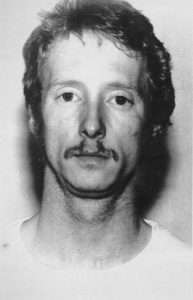Richard Boggs was executed by the State of Virginia for the murder of Treeby Shaw
According to court documents Richard Boggs would kill a person during an accident and would flee the scene. The next day he would go over to the home of 87 year old Treeby Shaw home and after a couple of cups of tea would attack the woman with a piece of steel before fatally stabbing her
Richard Boggs would be arrested, convicted and sentenced to death
Richard Boggs would be executed by way of the electric chair on July 19 1990
Richard Boggs Photos

Richard Boggs Case
Richard T. Boggs was executed in Virginia’s electric chair tonight for the 1984 murder of an elderly widow he killed to get money for drugs.
Boggs, 27, was pronounced dead at the state penitentiary at 11:07 p.m., hours after he lost last-minute court appeals, including one to the U.S. Supreme Court.
Gov. L. Douglas Wilder, who could have commuted Boggs’s sentence to life imprisonment, did not intervene. The execution was the first during the six-month-old administration of Wilder, a former death penalty opponent who changed his position several years ago.
Defense lawyers claimed that the state’s electric chair might malfunction and that Boggs suffered from brain damage.
U.S. District Judge Richard L. Williams turned down Boggs’s request for a stay of execution in the morning and a three-judge panel of the 4th U.S. Circuit Court of Appeals upheld the ruling late in the afternoon
Finally, the U.S. Supreme Court denied a stay at 8:45 p.m. The vote was 7 to 2, with Justices William Brennan and Thurgood Marshall, who oppose the death penalty in all cases, dissenting.
Boggs was sentenced to death for the Jan. 25, 1984, robbery and slaying of his Portsmouth neighbor, Treeby M. Shaw, 87. She had just poured tea for Boggs when he beat her with a metal bar and stabbed her. Boggs told police he killed the widow he had known all his life because he needed money for drugs. He took diamond rings from her fingers and family silver from the house.
He was charged with the murder after police found the silver in the trunk of Boggs’s car when he was arrested for killing a man in a hit-and-run accident. Boggs was convicted of murder for that crime and was sentenced to 30 years in prison
Richard Boggs’s attorney, David Bruck, argued that Virginia’s electric chair is virtually identical to the one in Florida that had to be switched on three times before it electrocuted murderer Jesse Tafero in May. Flames and smoke appeared from under the man’s head covering.
Robert Anderson, an assistant state attorney general, said the chair had been thoroughly checked and there was “no foreseeable prospect of a malfunction.”
Bruck also argued that tests conducted last week show that Boggs suffered brain damage from fetal alcohol syndrome and was unable to control his impulses.
Anderson countered that Boggs’s appeal to Wilder for clemency noted that the inmate had above-average intelligence, had written many letters from death row and often watched public television.
Wilder was an outspoken foe of capital punishment for most of his 16 years in the state legislature. Wilder, who represented a predominantly black district in Richmond, said that historically the death penalty had been indiscriminantly applied against blacks
But by 1985, as a candidate for lieutenant governor, he announced that he had changed his view, saying that more restrictive guidelines made it an appropriate punishment in extreme cases.
During his gubernatorial campaign last year, Wilder pledged to allow executions to be carried out if he were convinced that the penalty was appropriate.







